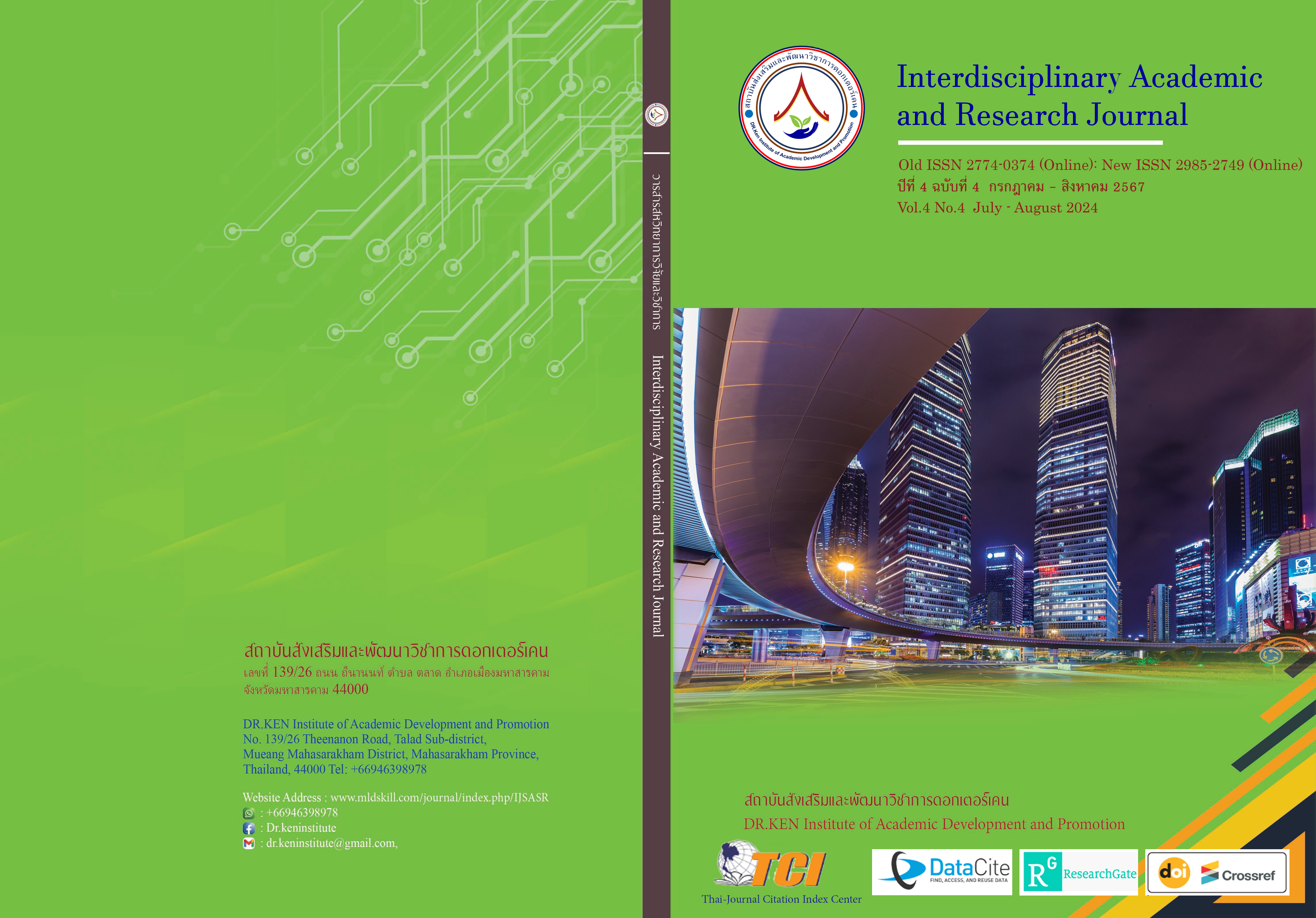Problems with Confirming the Seller's Identity in Online Purchasing Cases: Case Study of the Online Purchasing Division in the Civil Court
DOI:
https://doi.org/10.60027/iarj.2024.278596Keywords:
Online Trading, , Confirming the Seller's Identity, , Online Purchasing Division in the Civil CourtAbstract
Background and Aims: Academic article on Problems in verifying the seller's identity in online trading cases: A case study of the online trading case department in this civil court. The objectives are 1) to study the history and ideas about the establishment of the online trading court in the Civil Court 2) to study the problems of limitations in litigation to protect consumer rights in the online trading case of the Civil Court 3) to determine guidelines to improve the laws and methods for protecting consumer rights in online trading cases to be more effective.
Methodology: This study is a study of related documents and research. Analyze and present according to educational objectives.
Results: From the results of the study, it was found that there is a problem in confirming the identity of the defendant of the consumer who is the plaintiff in an online trading case in the civil court. The law and procedures for protecting consumer rights in online trading cases should be revised to be more effective as follows: 1) The Court of Justice has established an online trading case division in the civil court. To consider consumer cases according to the Consumer Court Procedure Act B.E. 2008 arising from the purchase of goods or services on the Internet. 2) Problems and obstacles in litigation that cannot be considered and adjudicated on online purchase cases. This is because most consumers who are plaintiffs do not know the identity of the defendant's business operator. who sells products because online trading is an agreement between people who are separated by distance and trusting consumers who do not take due care to verify who the seller is. When a dispute arose, the defendant seller could not be found. 3) Ways should be found to get more online business operators to register. By amending the law by increasing penalties for violators who conduct online trading businesses without commercial registration as announced by the Ministry of Commerce. There are stricter and faster legal measures by enacting laws or regulations forcing online market platform operators to seriously inspect and screen shops or sellers. There is a strict process for verifying the seller's identity. To create a system to guarantee safety in transactions. and prevent sellers who have problems or have violated the law and whose stores have been closed from being able to open new stores again.
Conclusion: All online trading business operators, whether small or large, should be required to identify themselves. By commercial registration in addition to being beneficial to consumers, having a registered business operator's store builds confidence among buyers, which has a positive effect on the business operator's store as well.
References
กรรณิการ์ ชัยอำนาจ. (2563). ปัจจัยที่มีผลต่อการตัดสินใจเลือกซื้อสินค้าออนไลน์ผ่านทางแอปพลิเคชัน SHOPEE ของคนวัยทำงานในเขตกรุงเทพมหานคร. การประชุมนำเสนอผลงานวิจัยระดับบัณฑิตศึกษา. คณะบริหารธุรกิจ, มหาวิทยาลัยรังสิต.
กฤษณ์กรวิชญ์ จันทขันธ์สกุล. (2560). ปัจจัยการสื่อสารการตลาดออนไลน์ที่มีผลต่อการตัดสินใจซื้อ สินค้าและบริการออนไลน์ของผู้บริโภค. การค้นคว้าอิสระบริหารธุรกิจมหาบัณฑิต, มหาวิยาลัยนอร์ทกรุงเทพ.
ชนิกานต์ ทะนันไชย. (2563). การคุ้มครองผู้บริโภคในการซื้อขายสินค้าผ่านช่องทางออนไลน์ กรณีศึกษาเปรียบเทียบกฎหมายไทยกับกฎหมายของสหภาพยุโรป (EU). การค้นคว้าอิสระปริญญานิติศาสตร์มหาบัณฑิต คณะนิติศาสตร์ มหาวิทยาลัยอัสสัมชัญ. จาก https://law.au.edu/images/publication/ISChanikarn-Tananchai
พระธรรมนูญศาลยุติธรรม. (18 พฤษภาคม 2543). ราชกิจจานุเบกษา เล่ม 117 ตอนที่ 44 ก, หน้า 1-13.
พระราชบัญญัติวิธีพิจารณาคดีผู้บริโภค พ.ศ. 2551. (2551). ราชกิจจานุเบกษา เล่ม 125. ตอนที่ 38 ก.หน้า 32-49, 25 กุมภาพันธ์ 2551
ศลิษา ทองโชติ, ประทีป ทับอัตตานนท์, และ สอาด หอมมณี. (2565). การคุ้มครองผู้บริโภคในการซื้อขายสินค้าและบริการทางสื่ออิเล็กทรอนิกส์, วารสารวิชาการศรีปทุมชลบุรี. 12 (2), 114-124.
ศิริลักษณ์ อรุณประดิษฐ์กุล (2566). การระงับข้อพิพาทออนไลน์: กรณีศึกษาแผนกคดีซื้อขายออนไลน์ในศาลแพ่ง, ใน พรภัทร์ ตันติกุลานันท์ (บ.ก.). ดุลพาห. พิมพ์ครั้งที่ 1. หน้า 90-115. จาก https://dunlaphaha.coj.go.th/articles/479
ศาลแพ่ง, (2566). หนังสือรายงานสถิติคดีของศาลยุติธรรมประจำปีพุทธศักราช (ฉบับภาษาไทย), กรุงเทพมหานคร: สำนักแผนงานและงบประมาณ, ศาลยุติธรรม
ศาลแพ่ง, (2567). หนังสือรายงานสถิติคดีของศาลยุติธรรมประจำปีพุทธศักราช (ฉบับภาษาไทย), กรุงเทพมหานคร: สำนักแผนงานและงบประมาณ, ศาลยุติธรรม
สำนักงานพัฒนาธุรกรรมทางอิเล็กทรอนิกส์. (2565). e-Commerce ซื้อขายปลอดภัย ไม่โดนลวง. Retrieved from: https://www.etda.or.th/th/Useful-Resource/knowledge-sharing/articles/Digital-Citizen/e-Commerce.aspx
สำนักงานศาลยุติธรรม. (2565). ประกาศสำนักงานศาลยุติธรรม เรื่องหลักเกณฑ์ วิธีการ และเงื่อนไขเกี่ยวกับการใช้วิธีพิจารณาคดีทางอิเล็กทรอนิกส์ในคดีซื้อขายออนไลน์. Retrieved from: https://jla.coj.go.th/th/content/category/detail/id/1602/iid/276016
Downloads
Published
How to Cite
Issue
Section
License
Copyright (c) 2024 Interdisciplinary Academic and Research Journal

This work is licensed under a Creative Commons Attribution-NonCommercial-NoDerivatives 4.0 International License.
Copyright on any article in the Interdisciplinary Academic and Research Journal is retained by the author(s) under the under the Creative Commons Attribution-NonCommercial-NoDerivatives 4.0 International License. Permission to use text, content, images, etc. of publication. Any user to read, download, copy, distribute, print, search, or link to the full texts of articles, crawl them for indexing, pass them as data to software, or use them for any other lawful purpose. But do not use it for commercial use or with the intent to benefit any business.
















.png)


